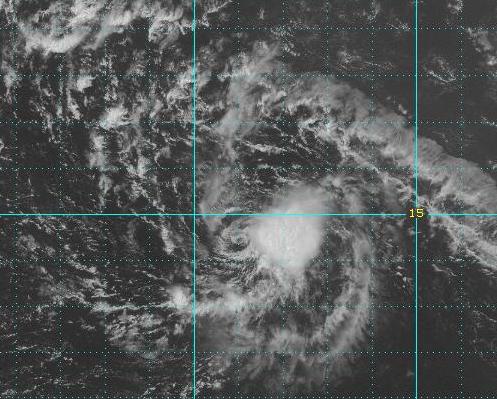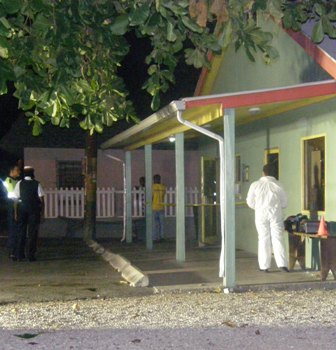Archive for August 15th, 2009

TD2 pops back up to become Tropical Storm Ana
 (CNS): (Updated Sunday 8am) — Having dissipated some time in the early hours of Friday morning, Tropical depression two regenerated on Saturday morning and has since developed into the Atlantic’s first tropical storm of the 2009 Hurricane season. At 8am AST on Sunday morning Ana was located about 470 miles east-southeast of the Leeward Islands and moving at a rapid 20 miles per hour.
(CNS): (Updated Sunday 8am) — Having dissipated some time in the early hours of Friday morning, Tropical depression two regenerated on Saturday morning and has since developed into the Atlantic’s first tropical storm of the 2009 Hurricane season. At 8am AST on Sunday morning Ana was located about 470 miles east-southeast of the Leeward Islands and moving at a rapid 20 miles per hour.
Storm force winds extend outward up to 70 miles from the centre and the NHC had issued a tropical storm watch for Puerto Rico, US Virgin Island, British Virgin Islands, Montserrat, Antigua, Barbuda, St. Kittts, Nevis, Anguilla, St. Maarten, Saba and St. Eustatius.
Following close behind Ana is Tropical Storm Bill which formed on Saturday evening and by Sunday 5am AST Bill was about 1640 miles east of the Lesser Antilles. Bill is predicted to become a hurricane in the next few days and if ANA doesn’t stengthen it will be come the first of the 2009 Atlantic season.
The NHC said the storm was moving near 13 mph and a gradual turn toward the west-northwest with an increase in forward speed was expected during the next 24 to 48 hours. M
The Hazard Management Cayman Islands (HMCI) reminded residents yesterday that we are entering the peak period of the season for storm activity despite the relatively calm early part of the season. Historical statistics show a dramatic increase in tropical cyclone activity beginning in early August and a steep decline in activity towards the end of October. Ninety six percent of the major hurricane days on record have occurred within this window.
On 14 August 1969 Hurricane Camille which was to become the strongest hurricane to hit the US main land (still) on record, formed as a tropical disturbance north west of the Cayman Islands. Crossing Cuba late on 15 Aug Camille emerged in the southern Gulf of Mexico with 100 mph winds.
By mid day on the 16 Aug reports from reconnaissance aircraft indicated that the storm had slowed, but was intensifying with sustained winds having reached 115 mph. By early evening, Camille was barely moving, but was intensifying rapidly with winds near 150 mph. By late in the afternoon on the 16th, an estimated 200,000 people fled from the US central Gulf coast, while 50 civil defence shelters were opened. By 17 August the tightly knotted vortex of Camille was measuring winds at 190-mph, with gusts over 220-mph. Camille’s 200 mph wind gusts and 25 foot storm surge, destroyed 100 years of growth and progress along the Mississippi coast in only three hours.
Hurricane Andrew in 1992) destroyed more property, and Hurricane Katrina resulted in many more fatalities in the US but Hurricane Camille remains the strongest storm to ever enter the United States mainland on record. Several other category 5 hurricanes in the Atlantic, and super-typhoons in the Pacific, have been as intense. However, unlike many of these super-storms that remained far out to sea, or weaken before making landfall – Camille struck land when at this rare intensity.

Bandwidth caps in Canada
 (NY Times): Canada’s Radio-television and Telecommunications Commission (CRTC) has decided that incumbent Bell Canada can charge its wholesale ISP customers based on the bandwidth usage of their end users, as first reported by CBCNews.ca. This decision puts pressure on smaller ISPs that are using Bell’s network infrastructure to implement bandwidth caps similar to those the telco isimposing on its own customers, or significantly raise prices for unmetered accounts. Bell’s new wholesale pricing structure includes bandwidth limits of as little as 2 GB per month for the lowest-priced wholesale DSL account and charges of as much as C$1.75 ($1.59) for each GB above that limit.
(NY Times): Canada’s Radio-television and Telecommunications Commission (CRTC) has decided that incumbent Bell Canada can charge its wholesale ISP customers based on the bandwidth usage of their end users, as first reported by CBCNews.ca. This decision puts pressure on smaller ISPs that are using Bell’s network infrastructure to implement bandwidth caps similar to those the telco isimposing on its own customers, or significantly raise prices for unmetered accounts. Bell’s new wholesale pricing structure includes bandwidth limits of as little as 2 GB per month for the lowest-priced wholesale DSL account and charges of as much as C$1.75 ($1.59) for each GB above that limit.

Police arrest 3 in GT shooting
 (CNS): Updated -Saturday 12:15 pm –
(CNS): Updated -Saturday 12:15 pm –
Police said that the 911 Emergency Communications Centre received a call at 7:52pm reporting that shots had been fired along Eastern Avenue in the vicinity of the Corner Restaurant. Police and medics responded to the scene and were told that three men had been injured. The men – aged 32, 30 and 24 – were subsequently treated at the George Town hospital for gun shot wounds. CNS understands that the men were shot in the feet and legs and two have now been released from the hospital but one is still being treated.
Three persons have been arrested in connection with the incident and remain in custody at this time and the police said they are treating the incident as attempted murder and appeal for anyone with information to contact George Town Police Station on 949 4222.
Unconfirmed reports from a number of sources say the shooting was directly related to illegal gambling.
Anyone with information about crime taking place in the Cayman Islands should contact their local police station or Crime Stoppers on 800-8477 (TIPS). All persons calling Crime Stoppers remain anonymous and are eligible for a reward of up to $1000 should their information lead to an arrest or recovery of property/drugs.

Observe and report
“The angry crowd yelled insults and obscenities at the politician, who appeared visibly shaken as he tried to make himself heard above the shouts and boos.” Or to put it another way, “The politician spoke to a packed audience.”
If the first version is an accurate account of events then the second isn’t, not because of what it says but because of what it doesn’t. The job of a journalist is to observe and report, and there are occasions when a ‘he said, she said’ account does a disservice to the readers because observations are a necessary component of the truth.
Most people do not have time to go to political meetings, sit through sessions of the LA, cover court cases and tribunals, and attend Public Accounts Committee meetings. That’s our job – to be the eyes and the ears of the public, to sit through 2, 3, 4, even 5 hours of an event and then condenseit into 800 or 1,000 words. And because we are immersed in current affairs day in and day out, journalists are sometimes in a better position than most to connect the dots. So if a politician says on Monday that his favourite colour is green and then swears on his mother’s grave Tuesday that it’s blue, it is our job to point that discrepancy out. That is not editorialising, it is observation.
Sometimes the truth hurts. If that same politicianturns up at a meeting without his trousers on, the public has a right to know, even though he might be upset when people read about it and learn of his unfortunate lapse. And if everyone else at the meeting complements him on the colour of his tie but pretends not to notice that he doesn’t have any trousers on, well, that’s worthy of comment, too. Action and reaction matter.
By the same token, if it is apparent that an MLA who is paid, as we recently found out, more than $9,000 per month is not doing what he is required to do, it is most certainly part of the journalist’s job to report that to the public.
During the last few meetings of the Public Accounts Committee (PAC) it has been glaringly obvious to anyone observing the proceedings that at least two of the members are not doing their jobs properly. This is not because they are new or because they are learning the role; it is because they have simply not read the reports they are meant to be scrutinizing.
As reporters we can ignore those shortcomings and just say that the committee asked some questions and then adjourned, or we can tell the truth. It is not editorialising to say that a meeting was bogged down in details that were irrelevant to the report supposedly being discussed. It is not editorialising to say that the questions appeared to be based on misunderstandings, or that they were unclear, or that the same ones were asked over and over again. It is not editorialising to note that a committee member insisted on calling a particular witness, and then didn’t ask him anything. These are observations.
This is editorialising: The two politicians in question should have earned this month’s $9,000 by actually reading the reports that were to be discussed from cover to cover and by making sure that they understood them before the meeting started. That way they could avoid questions that had already been answered in the reports and instead ask sensible questions to get to the bottom of how public money is spent. They should have made it their special mission, once voted onto PAC, to understand the function and workings of the committee so they did not waste everyone’s time going off on irrelevant tangents.
What elected representatives do and don’t do should be a matter for public discussion. Voters should know what the people they have elected are doing to protect their interests. If they are voted to a committee by their peers in the Legislative Assembly they must be held accountable for how they conduct themselves in those meetings. With few people attending PAC meetings, or any other LA meetings for that matter, the handful of reporters who attend are the only people who can tell the people honestly what actually happened.
There is a habit here in the Cayman Islands of not being entirely honest about what politicians say and do in order to protect them from ridicule when they make a blunder or don’t seem to have a clear grasp of an issue. But the job of reporting is not to protect the politicians but to represent the public. We should not be afraid to tell the real story – because if we don’t, who will?
We believe that the public deserves to know what the elected representatives, who have been entrusted by the voters to serve, do for their salary, and for that they need more honest reporting than they bland fare they have been used to. Some people have criticised our coverage of the recent PAC meeting, but for CNS not to have told the observable truth about such obvious andevident shortcomings on the part of elected MLAs would have been a disservice to the people who voted for them.